I just love this new, Yiddish rendition of Woody Guthrie's "This Land Is Your Land" for a whole bunch of reasons.
reviewing Black Doves; Cross; Dark Matter; Dept. Q; Dexter: Resurrection; Dune: Prophecy; For All Mankind; Foundation; Hijack; MobLand; Outlander; Presumed Innocent; Prime Target; Severance; Silo; Slow Horses; Smoke; Star Trek: Strange New Worlds; Tehran;The: Day of the Jackal, Diplomat, Last of Us, Night Agent; Your Friends and Neighbors +books, films, music, podcasts, politics
George Santayana had irrational faith in reason - I have irrational faith in TV.
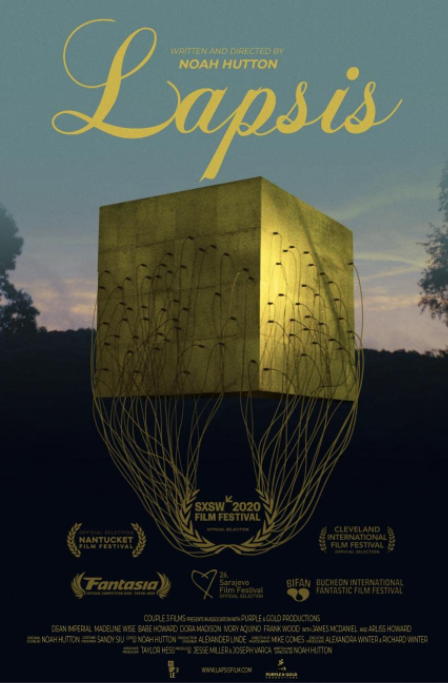
In our COVID-ridden real world, a near-future science fiction movie in which codes and AI are villains is something of relief, in addition to being unsettling, especially if it's well done, which Lapsis very much is.
A new computer system, QUANTUM, is revolutionizing, or promising to revolutionize, our civilization. In order for it to work best, remote areas have to be connected to the network by CABLRs, i.e., independent contractors who lay the cable. They have competition, though, from robot cablrs, also working for the same company. Their purpose is apparently both to keep the human cablrs on their toes as well as laying their own amount of cable.
Ray, desperate for money to pay for his kid brother's medical treatment (he has "omnia," a chronic fatigue syndrome) takes a job as a cablr. Dean Imperial, whom I've never seen before, plays Ray like a minor character from The Sopranos struggling for his day in the sun, or, in this case, the dense forest. (I'd say The Sopranos is about the best series ever to have been on television, so that's high praise.) The forest work is grueling, edgy, even dangerous, and Ray's compensation as an independent contractor is tenuous at best -- hence, Heart of Darkness meet Uber.
Along the way, in and out of the forest, the movie takes shots not only at high-tech, but medical facilities and health-food stores. Ray has some difficulty understanding what's going on a first, but gets almost all of it in the end -- a journey which is actually reassuring to the viewer, who may well be taking the same cognitive trip. It was good to see James McDaniel (NYPD Blue) and Dora Madison (Friday Night Lights) on the screen, and the music was good, too.
That was by Noah Hutton, who also wrote and directed this movie. He's the grandson of Jim Hutton and the son of Tim Hutton (and Debra Winger) and in this his first movie continues the fine tradition of his family.
Anne Reburn is one of the very best of the new crop of artists who have done astonishingly good covers of classic rock songs ranging from the Beach Boys to ELO. These include Foxes and Fossils, The286, Mr. Jack, The Fendertones, Hal Eisenberg, and The Petersens. In fact, Reburn is in one way even more remarkable, because she sings and plays all of the parts herself.
So I was eager to hear what Anne Reburn sounds like singing a song she wrote. That happened yesterday, with a new release, "Everywhere and Nowhere". She chose to make the video purely acoustic, with lyrics, so we don't see the fetching visual performance of her "clones" that we get on her cover videos. But the song and the performance of "Everywhere and Nowhere" are more than fine.
The song is reminiscent of early James Taylor and even a bit like something from the Beatles' Rubber Soul. It's about love and places, in particular how the place doesn't matter if you have the love, "I'll write a song about how I don't need those places if I've got you with me ... It's not where we are, it's the company."
Her voice has a wispy sweetness with a hint of the sea of power and conviction underneath. The guitar and feel is acoustic, mostly folk but country on edges. As much as I enjoy Anne Reburn's covers, I'm looking forward to hearing more of her original work. Our world is sorely in need of her light touch.
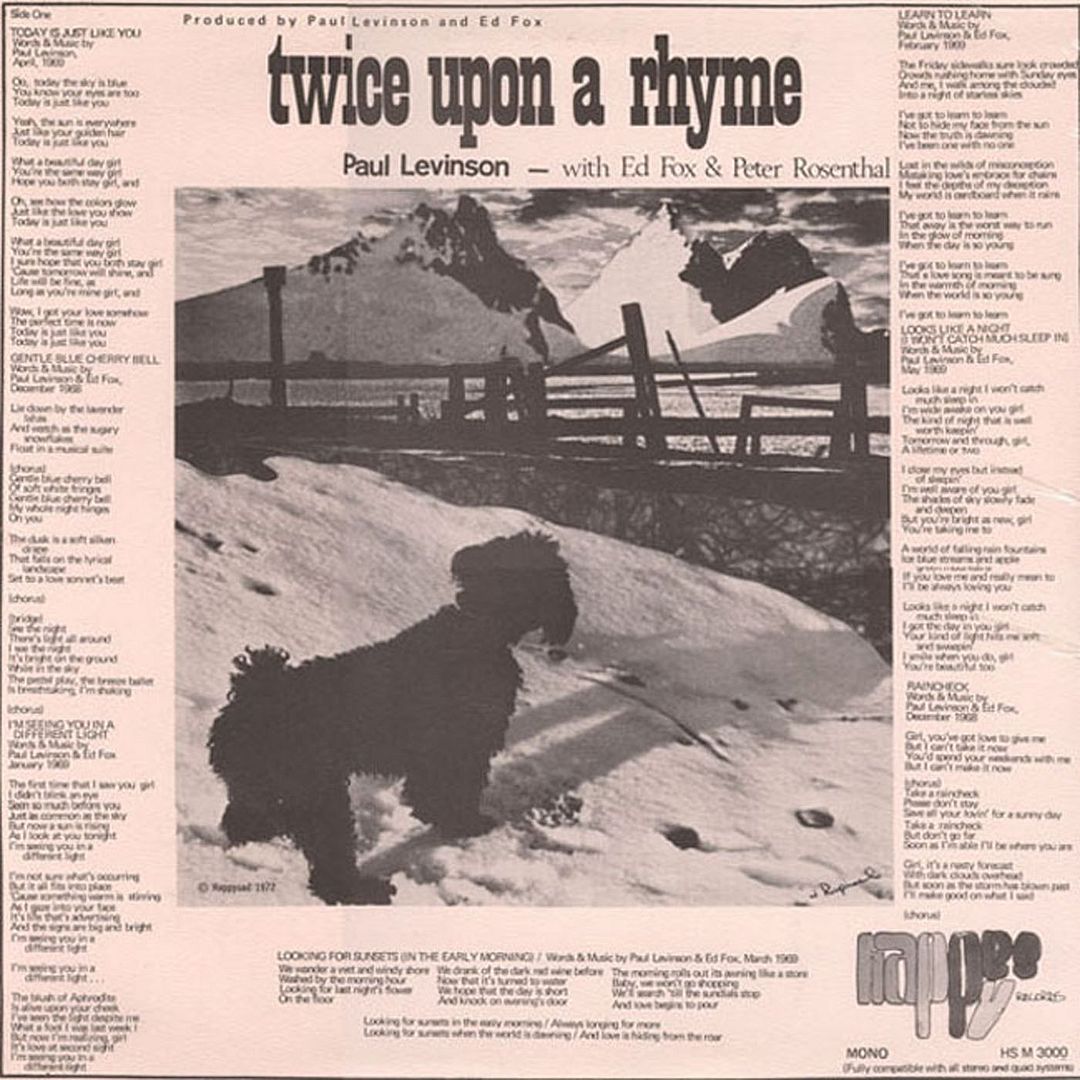
on Bandcamp, Spotify, Apple, Amazon
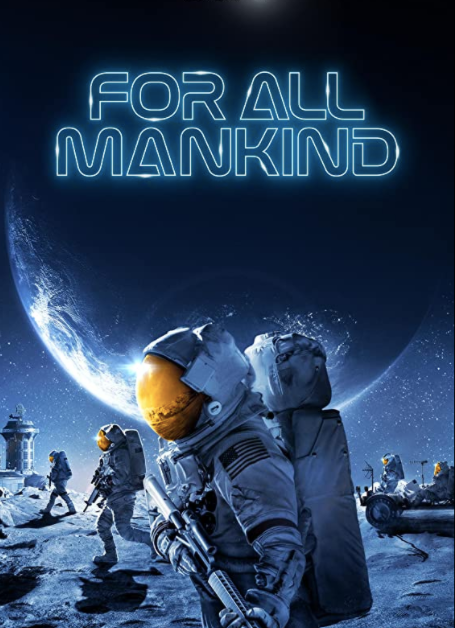
In some ways my favorite scene in For All Mankind 2.2 on Apple TV+ was Margo struggling to get a peanut butter sandwich out of a vending machine in the early 1980s. Here's a woman who plays a major role getting people to and back from the Moon, doing battle with a recalcitrant vending machine. And, her scientific knowledge about "negative pressure" saves the day and gets that sandwich to drop, just as her savvy is still working to get people up on the Moon.
Otherwise, it was good to see John Lennon in this alternate history alive in the 1980s (as we saw would happen last week) and complaining about Ronald and Nancy. And it was reassuring to see the Mars mission still in prime focus, although it continues to be delayed and more of its funding allocated elsewhere, to the Moon.
This uncovers what will be a significant problem in this alternate reality. In one sense, it has to be easier to get to Mars with an active base on the Moon. On the other hand, the needs of the Moon base will divert attention and money from a voyage to Mars. For that reason, we may have an easier time getting people to Mars in our reality, with nothing much on the Moon at present other than grand memories of the past.
The question of who may be on that first ship with people to Mars was also answered at least in part tonight. Two people who were on the Moon -- Danielle and Gordo -- will be going back there. My guess is, before this season is over, Ed will be back in space, too. I'm hoping that will be on the first voyage to Mars.
And I'll see you back here next week.
See also For All Mankind, Season 1 and Episode 2.1: Alternate Space Race Reality

to be published 23 March 2021 by Revelore Press
Marshall McLuhan wrote about the media in a poetic style, preferring aphorism and metaphoric relations to the bleary-eyed recitation of more conventional media scholars. His style frustrated far more than it delighted in academe, but the passage of time has increasingly confirmed his enormously pathbreaking contribution to understanding media. His grandson Andrew writes poetry about media and other aspects of life on Earth in his new book, his first book, Written Matter. My guess is it will delight lovers of the written word and seekers of truth about our complex existence.
The book begins with eight short poems (all the poems in this volume are short) that start with the media and "the flow of ink, the slow of think" and "when a pen fails, a pencil sails," and returns to media later in the book "where words lay waste ruin". But my favorite poems in this little volume are about nature, as in "the fall softness becomes brittle" and about human life, as in "there I tread where tears tear time".
Half the book are photos taken by Andrew that in one way or another complement the poems on the left-hand side, so we're talking about a total of 28 poems in this volume. I read them in about 20 minutes, but I expect to return to them often in the years ahead.

on Bandcamp, Spotify, Apple, Amazon
There's a famous, true story about a lecture Marshall McLuhan gave at Louis Forsdale's seminar at Columbia University in New York City in the 1950s. McLuhan observed, at some point, that nudity wasn't a notable thing until the alphabet -- that sensitivity about nudity was an effect of alphabetic literacy.
When McLuhan concluded the lecture, Forsdale opened up the seminar to questions. Robert K. Merton, often known as the "dean" of American sociology, was in the audience. He raised his hand, was called upon, and stood. His face was almost purple with anger. "I don't where to begin," he began, "everything you say is nonsense, where is your evidence ... what on Earth does nudity have to do with the alphabet?" And he went on like that for at least ten minutes.
McLuhan rose, a twinkle in his eye, a smile on his face. "Oh," he said, "you didn't like that idea? Well, how about this one?" And he proceeded to talk, much longer than Merton, about something completely different.
Now, this event is often cited, including by me, as an example of McLuhan prizing exploration and probes over explanation and proofs. And it certainly is.
But someone asked me the other day what I thought McLuhan really meant about alphabetic literacy being the ground for interest in nudity. This was my answer:
I never asked McLuhan about this, so I don’t know exactly what he meant about the alphabet making people more sensitive about nudity. But here’s what I would say, applying McLuhan’s thinking to this question: The alphabet is an abstract mode of communication – the letters of the alphabet have no direct resemblance to the objects they describe in written words. The word “cow” for example, looks nothing like a cow, the word “sun” looks nothing like the sun, etc. (Unlike ideographic writing, in which the written symbols look at least a little like the objects they describe.) So, people who use the alphabet are aware of the “cover” or the alphabetic word, and the reality it describes (the word “sun” and what the sun really looks like). And clothes, of course, are a cover, too – a dress or a shirt doesn’t really look like the naked body beneath. But just as we use the alphabet to write about things, so we usually see and interact with people in clothes. In such a society, we become hyper-aware, more sensitive, about someone wearing no clothes at all.
So, what did you think of my explanation? Did you like it? Not sure? Ok ... let me tell you how my Prius retrieves Cinderella's Pumpkin Coach, when you leave it in the driveway for more than a month, undriven in this Covid lockdown.
This one's a real beauty from August 2020: a combination of the U.K. group The286 and the Argentinian group Mr. Jack doing a spot-on rendition of one of my all-time favorite songs by one of my all-time favorite groups: "Can't Get It Out of My Head" by the Electric Light Orchestra.
They even get "wave chicane" right -- that is, I think so, because, just like in Jeff Lynne's voicing, it almost, very nearly sounds like "wave she came".
My only regret is you don't see the head that goes with the fingers with the light turquoise fingernails that play that synthesizer so well. But, hey, Spencer Hannabuss as lead sounds like he's close to getting tongue-tied in the "William Tell" sequence, just like Jeff Lynne, and Madeleine Sugden sure evokes Stevie Nicks, so enjoy.
Welcome to Light On Light Through, Episode 168, in which I review For All Mankind (Season 1 and Episode 2.1)
Blog post review of For All Mankind
Podcast reviews of other Ronald D. Moore TV series:
Red Moon (2000) by David S. Michaels and Daniel Brenton
The Missing Orientation -- why we've made so little progress on and beyond the Moon in our reality
The Loose Ends Saga -- another alternate space travel history

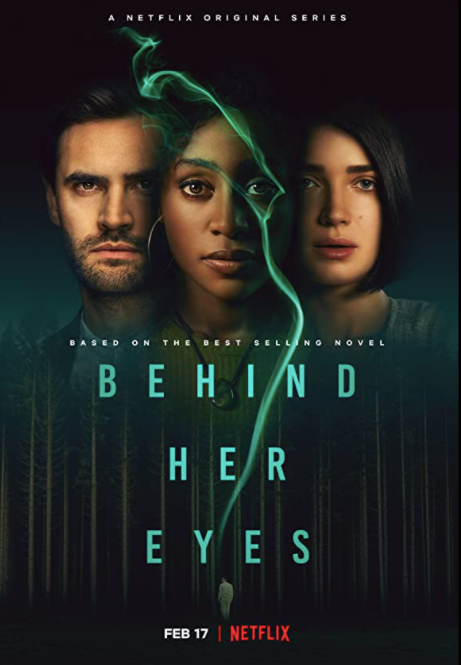
There's a fundamental guiding principle about mystery/science fiction hybrids that I've heard endorsed by many on science fiction convention panels over the years, including me, that you shouldn't mix protocols, because your readers and viewers won't like it. Here's a hypothetical example: a murdered body is found in a room with the doors and windows locked from the inside and completely intact. The world in which that body is found is ours, in 2021. You can't solve the crime by suddenly, at the end of the story, have the murderer beaming in from the outside.
Now I'm telling you this because, although Behind Her Eyes doesn't quite do that, it comes close, too close, and I was irritated by the ending. It spoiled an otherwise suave, tense, stylish six-part mini-series that just showed up a few nights ago on Netflix.
The set-up is: David is unhappily married to Adele, starts an affair with Louise (whom he meets in a bar and they kiss before they both realize that Louise is working in David's new office), and Adele, not knowing about David and Louise, becomes close friends with Louise. There's also another character, Rob, who was friends with Adele and David a decade ago, and one of the two may have murdered. That's a pretty strong and intriguing set-up, and the story is very well played by Eve Hewson as Adele, Simona Brown as Louise, and Tom Bateman as David -- especially Hewson and Brown, who are riveting and exceptional in every scene. The dialogue is snappy, too, with Louise tossing off lines like "you washed me away" after David takes a shower after he makes love to Louise.
But the plot is good, too, up to but not including the end. All three major characters -- David, Louise, and Adele -- are occasional liars, and one is very likely a murderer. It's never clear who is taking advantage of whom, until it all comes to a head and is spelled out at the very end.
[Spoilers ahead.]
It turns out that Rob mastered the ability, at least ten years ago, to swap his consciousness with someone else. He does this with Adele, who doesn't like her consciousness inside Rob, and when "he" says so, Rob inside Adele kills Adele inside Rob. Something similar happens at the end, after six episodes in which the only inkling of such abilities are ephemeral whisps in air when the characters are sleeping and talk of lucid dreams.
Which to me was a rabbit out a hat, a beaming in to solve a murder, in a story that deserved a less fantastical ending.

Ronald D. Moore is best known for his creation of the Battlestar Galactica reboot and Outlander, two very different TV series which were (BSG) and are (Outlander) justly lauded masterpieces of science fiction (maybe Outlander is science fantasy, but the point still holds). Moore had a lot riding on For All Mankind, another, very different kind of science fiction series. I just saw the entire first season (which began to air on Apple TV in November 2019) and the first episode of the second season (which started airing yesterday). It's at least as good as Battlestar Galactica and a little better than Outlander. In my never humble opinion.
The series rests on a bold premise: had the Soviets beaten the US to the Moon by just a slight margin in 1969 -- one month -- the result would have been much better for getting humans out into space because the competition between the two superpowers would have continued and intensified. In literary terms, it would have set in motion an alternate reality in which the two superpowers continued vying to be the lead and dominant humans beyond our planet.
As far as our reality or real history, it's entirely plausible that the Soviet Union could have pulled a fast one and beaten us to the Moon by a month. It's not really clear, to this day, why the Soviets after the mid-1960s fell so far behind the US, after being first to get a satellite (Sputnik), then a satellite with a dog (Laika), and then a satellite with a human being (Yuri Gagarin) off of this planet into space. Indeed, the best explanation I've read of why the Soviet Union fell behind the U.S. in the space race comes from a little-known science fiction novel published in 2000, Red Moon, which was also the title of the first episode of For All Mankind.
The alternate history and the real history in For All Mankind was handled plausibly and provocatively, no easy task to pull off smoothly, as the first season and the beginning of the second season did. My favorite alternate history gambit in the first season is Ted Kennedy cancels his trip to Chappaquiddick, to focus on why the US space program fell behind the Soviets, and is elected President in 1972. Walter Cronkite and Barbara Walters deliver the news without being named via actors who look and sound like them. Nixon, Teddy, and (at the end of Season 1 and the beginning of Season 2) Reagan are presented in real footage and photographs, via voices that deliver alternate-history speech via impersonators or who knows how they got those voices, but it worked. The second season starts with a nice handful of alternate history touches, including John Lennon surviving the attempt on his life but the Pope not.
Other major changes in the history of For All Mankind include women achieving importance as astronauts and in flight control long before they did in our reality. Permanent bases are established on the Moon by the U.S. and the Soviets in the 1970s. By the 1980s, the science of space travel has led to electric cars on Planet Earth. But the human success in space has by no means wiped away all the inequities we have suffered from in this reality. Prejudice against gays warp the personal life of at least one astronaut, and immigrants are treated badly by the FBI obsessed with rooting out Soviet spies.
The personal lives of the astronauts of course play a major and tempestuous role in the narrative. Ed Baldwin (played by Joel Kinnaman who never misses), Tracy Stevens (Sarah Jones), and Molly Cobb (Sonya Walger) are my favorites, but all the characters are memorable and well acted. And the lives portrayed are realistic. Death always lurks near life, ready to rear its head, and this is more so when that life is in space. Just as in our own reality, not everything goes right or as expected in the grand endeavor to get us off this planet, and you'll be on the edge of your seat for just about every episode in this remarkable series.
For All Mankind picked a good time to debut its second season, the day after the NASA Rover landed on Mars in our reality. I'm hoping that the series continues long enough to show us astronauts arriving on Mars -- I'll be reviewing every episode from now on -- and that this alternate reality converges with our reality, in which we send people to Mars, too.
Further on why our own space program stalled after Moon landing: The Missing Orientation
And here's an alternate-history space-race novel:
Here are some of my thoughts about the Trump impeachment acquittal and where we go from here, a week after the conclusion of the Senate trial:
1. Mitch McConnell's vote and statement: I of course was very disappointed but not surprised by McConnell's vote to acquit Trump. I was surprised by McConnell's accompanying statement, both the content and the intensity. In particular, that McConnell said
There’s no question, none, that President Trump is practically and morally responsible for provoking the events of the day. No question about it.... Trump is still liable for everything he did while he was in office, as an ordinary citizen. Unless the statute of limitations is run, still liable for everything he did while he was in office. Didn’t get away with anything, yet. Yet. We have a criminal justice system in this country. We have civil litigation and former presidents are not immune from being accountable by either one. [See here for the transcript of McConnell's statement.]
There's no doubt that the country -- and therefore the world -- would have been better off had Trump been found guilty and thereby prohibited from ever holding public office again. But McConnell's statement is nonetheless part of the record of the impeachment process, and is and will be of great value. It shows that, whatever McConnell's reasons for voting for acquittal, he nonetheless thought Trump was responsible for the insurrectionist riot, and, just as important, ought to be held accountable for his actions and non-actions. Coming from the Republican Senate Minority leader, that's significant, and will be prominently noted by historians.
2. Republican attacks on Republican Senators who voted to convict Trump: McConnell also said that "I respect my colleagues who’ve reached either conclusion" about whether a conviction of Trump in the impeachment trial would be constitutional. Not so some other Republicans around the country, including local Pennsylvania GOP Chair Dave Ball, who said
We did not send him [Senator Pat Toomey, who voted to convict Trump] there to vote his conscience or ‘do the right thing' or whatever he said he was doing there. We sent him there to represent us. [Interview on KDKA-TV]
Now there's been a debate as old as our republic about whether our elected representatives should vote their conscience or ascertain what the people who elected them want. I've always been a strong supporter of conscience, on general principle, and also given the unreliability of polling in discovering what the voters want. But the position of finding out what the public wants and basing your vote on that at least has a logic to it, and is consistent with the democratic process. Is that what Ball was urging? I don't think so. The "we" in that last sentence more likely refers to the Republican Party, who put Toomey up for general election and supported his campaign. And if that was what Ball was saying, that Toomey should keep in line with his party's policies, that's disturbingly reminiscent of insistence on adherence to the party line in totalitarian societies like the former Soviet Union.
3. Biden Administration response to Trump acquittal: The Biden Administration clearly wants to focus on the pandemic and other challenges it views as more urgent than what to do now about Trump. Vice President Kamala Harris said today on the Today Show:
Right now I'm focused on what we need to do to get relief to American families and that is my highest priority, it's our administration's highest priority, it's our job, it's the job we were elected to do, and that's my focus. [See more on that here.]
I agree completely with Biden and Harris. Not only is the pandemic an obviously immediate life and death matter -- on a massive scale -- but there are other ways to hold Trump to account. New York and Georgia are already investigating criminal charges against Trump, and the U.S. Attorney General's office, which Biden wants to be non-political, i.e., not serving Biden's political interests as Attorney General William Barr did Trump's, can investigate Trump and seek to indict him, without instruction from Biden.
In sum, although conviction of Trump in the impeachment trial was amply merited and would have benefited the country, we who value justice and freedom and democracy are in a good position to do something about the fascist former President who did so much damage to our country.
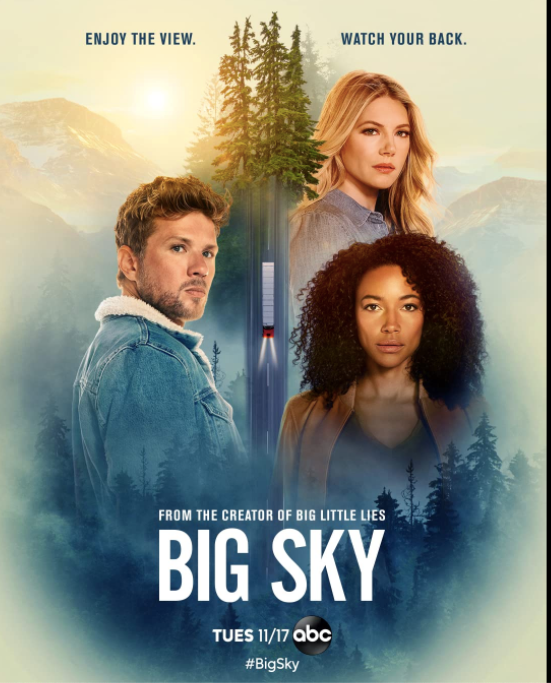
Let me start by mentioning my favorite line. That was from Big Rick's lawyer, who says "Bobby Orr voted for Trump". I already forgot the context, but it's a standalone great line anyway.
And, of course, one big development in 1.9 is that Rick will no longer need an attorney. His wife hammered him to death. I'm pretty but not positive he was faking his amnesia, and he certainly remembered enough to convince his wife that he was evil Rick who almost killed her. Well, for Big Rick's fans, there'll always be that lifelike cardboard stand-up figure of Rick.
The other big news is the brilliant strategizing of Ronald. After killing his mother and the priest, and kidnapping the boy, and being recognized by Cassie, he manages to escape everyone's best efforts to nab him by employing elements of all three victims: (1) his mother's corpse, dressed as a boy, nearly gets Jenny blown up, (2) he has the priest's body auto-drive the Tesla with the kidnapped boy next to him, which (3) leads everyone on a wild goose chase. Well, not a goose chase, because thank goodness the boy is now safely back with his mother, but the chase was one of the wildest I've seen on television.
So Ronald's on the loose, Rick is dead, and the slate is almost clean. And the show won't be back until April. It certainly has had a unique narrative structure, with tonight's ending, and the winter break ending last year, which would have worked well as conclusions to a somewhat truncated and a very truncated series. Is that what David Kelley had in mind, in case the series was cancelled?
Who knows, but I'm glad it wasn't, and I'll be back here in April with more reviews when Big Sky resumes.
See also Big Sky 1.1: A Pretty Big Deal ... Big Sky 1.2: The "Goods" and the Ruined Plan ... Big Sky 1.3: "You Kidnapped the Wrong Girl" ... Big Sky 1.4: Controls on Psychos ... Big Sky 1.5: Winter Finale Indeed! ... Big Sky 1.6: "Sweet Psycho" ... Big Sky 1.7: The Montana State Trooper
My review of The Map of Tiny Perfect Things, on Amazon Prime Video. If Groundhog Day is a 10, I rate The Map of Tiny Perfect Things a substantial 9. I explain why.
further reading, blog post: Review of The Map of Tiny Perfect Things
further listing: Welcome Up: Songs of Space and Time
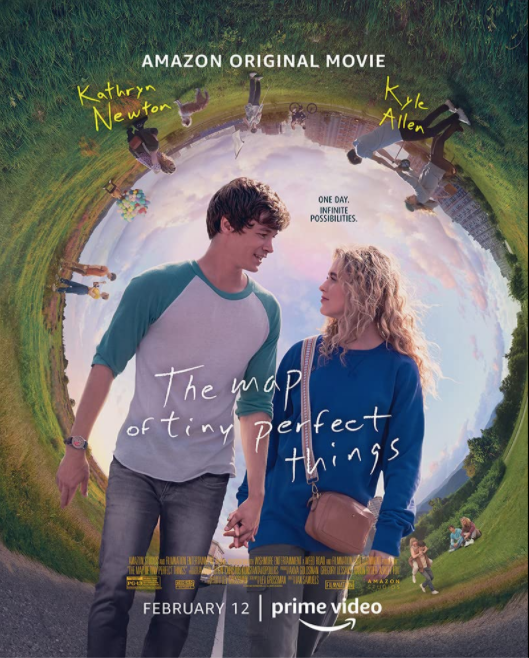
The Map of Tiny Perfect Things, from the novelette by Lev Grossman (The Magicians) and screenplay by him, debuted on Amazon Prime video a few days ago. Its ratings on Metacritic and Rotten Tomatoes are 6-7, but I think it's much better than that, well over 9. It's said to be a Groundhog Day (the holiday and the movie) meets Valentine's Day (just the holiday), but it's more than that, too.
The similarity with Groundhog Day, which I'd give a 10 on that scale, is Mark is reliving the same day. He confides this to his friend Henry, who, aware of Groundhog Day, suggests that Mark might be able to break out of this time loop by getting a girlfriend. (Note: I like movies that explicitly reference other movies. It's not the biggest deal, but it adds a nice meta-touch.) Mark is in the process of trying to do that at the pool, by stopping a beach ball from hitting a girlfriend candidate, but not having much luck. Until Margaret enters the picture (literally and figuratively) and everything changes.
Slowly. Mark and Margaret are clearly having fun, and are really attracted to each other, but Margaret says no when Mark wants to kiss her. He's a little hurt, of course, and even more so when he connects the demurral to Margaret's leaving each evening after receiving a phone call from a medical student, Jared. The course of true love never did run smooth, especially when that course is a time loop.
And here the movie takes a crucial turn. As Mark and Margaret pull apart, we find Margaret at the center of the story. She's still in the time loop, but it's her time loop. And as her story unfolds we learn that, indeed, it's more her time loop than Mark's. Her mind or whatever created the time loop, because her mother is dying, and she didn't want to lose her mother, didn't want that day to end. That makes perfect sense, and I actually like that raison d'etre for the time loop even better than the reason in Groundhog Day.
But the one thing Margaret didn't expect or count on was finding someone like Mark. And, ok, I won't spill any more of the plot. I will say that I thought the title, though well explicated in the movie, doesn't due the truest heart and soul of the movie sufficient justice. But the acting was great, both Kyle Allen as Mark and especially Kathryn Newton as Margaret, and the music was excellent, too, especially the Bruise's closing "1992," which not only worked just right for the movie but is an apt song for the real world around us today. (Here's another, much lesser-known song that came to mind as I was watching The Map of Tiny Perfect Things: "I Knew You By Heart".)

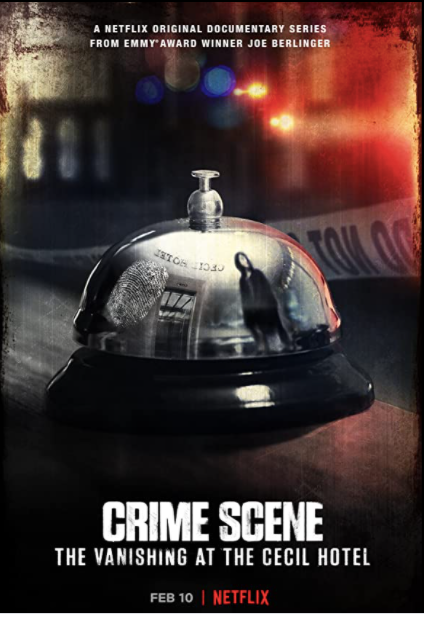
Crime Scene: The Vanishing at the Cecil Hotel, a four-episode true-crime documentary, debuted on Netflix a few days ago. On the one hand, it's another example of an emerging sub-genre in True Crime: the investigation of a crime, or presumed crime, by crowd-sourced Internet sleuths, which has had such notable examples as I'll Be Gone in the Dark (HBO, June-August 2020) and Don't F**k with Cats: Hunting an Internet Killer (Netflix, 2019) (I saw both, but reviewed neither, because enough is enough already). On the other hand, Crime Scene exposes some coincidences so vexing that they call for Karl Jung or Arthur Koestler for explication, which of course they cannot provide, if only because they are no longer with us.
Crime Scene does provide a refreshing warning about Internet sleuths, refreshing because in most of these documentaries, the amateur web detectives are right when the police are wrong. In Crime Scene, which details and investigates the death of Elisa Lam at the hotel in 2013, the Internet sleuths are wrong in their conclusion that Lam was murdered, and admit at the end that the police explanation that Lam, suffering from bipolar disorder, jumped in the water tank on the roof of the hotel and drowned in a death by accident. Among the consequences of the pixel investigators' error, they wrongly accused "death" heavy metalist Morbid of the murder (he was at the hotel a year before Lam's death), and ruined his life in an early example of cancel culture.
But the Internet researchers also uncovered at least two amazing coincidences, apparently inexplicable by conventional logic. 1. Los Angeles' Skid Row, where the Cecil Hotel was situated, suffered an outbreak of tuberculosis when Lam was there. And ... the name of a major test for tuberculosis is LAM-ELISA. 2. Lam purchased some books from The Last Bookstore on her ill-fated visit to LA. And ... the bookstore's online registrant's postal code (whatever exactly that is) is V5G 4S2 -- if you put that code into Google Maps, it points you to the place where Lam is buried, in Forest Lawn Memorial Park in Canada.
Ok, coincidences do happen. But these two do seem to be more than the average coincidences that happen in life, like the first name of your new neighbor is the same as a childhood friend, and he or she went to the same high school as you and your friend, in a different city. Carl Jung calls the more bizarre, all-but-impossible coincidences that can crop up in life -- or death, in the case of Elisa Lam -- a "synchronicity" or "meaningful coincidences," which operate outside of causal relationships. Arthur Koestler in his Roots of Coincidence builds upon Jung, and argues that such coincidences are para-normal, or outside and beyond the realm of science.
Whether you're convinced by Jung and Koester or not -- I'm not sure if I am -- there's no denying that the coincidences in Elisa Lam's true crime story are worthy of both theorists, and their appearance in Crime Scene may be its most durable virtue.
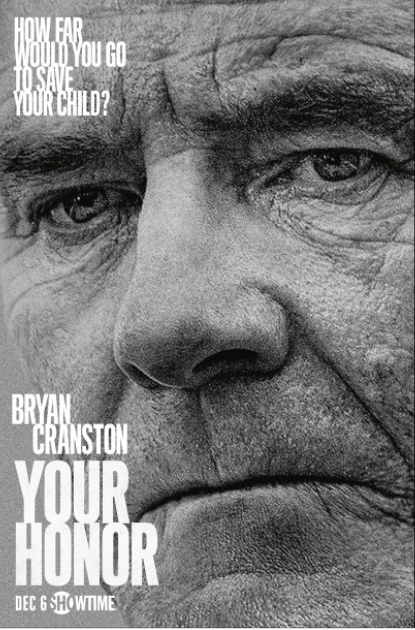
I'll start by saying I didn't like the ending -- not because it wasn't 100% well-motivated, and flowed from everything in the story, but, because, well, it was so unhappy,
Michael did everything he could to save his son. Most of it worked. He was willing to sacrifice himself to save Adam. But there were too many deadly pieces in play. It was impossible for Michael to account for all of them. He certainly could not have foreseen that Eugene, with no moves left after Michael did not let him testify, would put a bullet in Adam when Eugene shot at and missed Carlo, who had killed Eugene's brother Kofi and was getting away with it.
I guess the moral of this story is you can't control events with so many deceptions at play. Part of Adams's fate, though, was also sealed by his falling in love with Fia. That's why Adam was at the celebration. Jimmy already knew that Adam not Michael had hit-and-run killed Rocco. So even if Eugene was not at the hotel, Adam would likely have been killed.
Ironically, or just to add to the irony, Eugene would not have gotten into the hotel had not Jimmy's men not been distracted with keeping Michael out. And that's really a thumbnail of everything in this story; just about every lie Michael told ultimately worsened the situation for himself and Adam.
Back to the acting: this was a rare series in which every character was memorable. The lawyers, the Baxter family, each could have a spinoff series of their own. But most of all Bryan Cranston as Michael Desiasto aka Your Honor, who gave a tour de force (too weak a phrase) performance in this Shakespearean tragedy in New Orleans.
See also Your Honor 1.1: Taut Set-Up ... Your Honor 1.2: "Today Is Yesterday" ... Your Honor 1.3: The Weak Link ... Your Honor 1.4: The Dinner ... Your Honor 1.5: The Vice Tightens ... Your Honor 1.6: Exquisite Chess Game ...Your Honor 1.7: Cranston and Stuhlbarg Approaching Pacino and De Niro ... Your Honor 1.8: Nothing More Important ... Your Honor 1.9: Screeching Up to the Last Stop Before Next Week's Finale
There's been word that Trump's attorneys in his Senate impeachment trial will say Trump's incendiary words to the crowd before they turned and savagely attacked the U. S. Capitol on January 6, 2021 were protected under the First Amendment, in particular that Congress "shall make no law abridging ... the freedom of speech". So, Congress cannot punish Trump for the words he spoke on that morning.
Two arguments have been raised against that view.
The first, I think, is incorrect. I heard John Dean say on CNN (and other pundits on other channels) that the First Amendment is meant to protect citizens from the government, not the government (Trump as President) from the government (Congressional impeachment and Senatorial conviction). But that can't be right. If Trump as an American citizen has no First Amendment protections because he was President, how about the Vice President? How about members of Congress? How about Governors and Mayors and anyone who works for any part of the government? Should First Amendment rights be waived for elected officials but not appointed officials? How about for firefighters and sanitation workers? Suspending any citizen's First Amendment rights because they are a government official creates an absurd slippery slope which would start with the President and extend to many millions of people -- as of 2011, the Office of Personnel Management reported 2.79 million people working for just the Federal government. Do all of those people have no First Amendment rights? Chances are few of those government employees knew they were surrendering their First Amendment rights when they signed up or campaigned for those jobs.
The second argument, presented by House impeachment manager Jamie Raskin, is much better and, I think, completely correct. Representative Raskin said yesterday that the First Amendment doesn't protect someone who incites others to riot. Those words spoken by Trump on that morning to an angry and armed crowd, urged to walk down the street to the U. S. Capitol, provoked not just a riot, but a riot that killed a police officer, and wounded more than a hundred more, not to mention the severe vandalizing and threat to lives of the Vice President, Senators, and members of Congress, and their staffs. The First Amendment has been repeatedly cited by U. S. Supreme Courts as not protecting speech that directly leads to attacks on life, limb, and property, and that's precisely what Trump's exhortations to the crowd on January 6, 2021 did.
Trump is responsible for his riot-provoking words, which in fact provoked a deadly riot, and that's why the First Amendment offers him no protection for those words. I think it's important to get right, and not confuse the issue with unspoortable arguments that people lose their First Amendment rights when they become part of government.
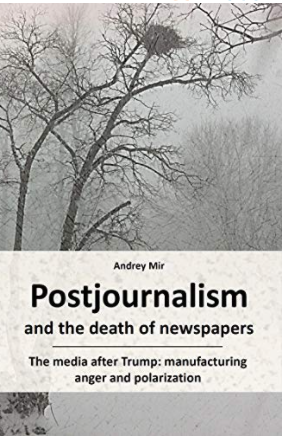
The full title of Postjournalism and the Death of Newspapers. The Media after Trump: Manufacturing Anger and Polarization by Andrey Mir says it all: the delivery of news on Twitter and social media to an increasing majority of people has replaced the attempt to disseminate facts and truth on traditional news media, with the new goal of massive engagement via likes, retweets, and shares, with the result that an informed public, however imperfectly constructed, is being shoved aside by a polarized populace seething with anger. I would add: this is also the best book on media theory and assessment written in forty years.
Mir brings to bear the media insight of Marshall McLuhan, the political savvy of Walter Lippmann, the radical economy of Edward Herman and Noam Chomsky, and much more in his detailed and probing analysis. The 20th century began with newspapers selling news to readers and concluded with newspapers and radio and TV selling news to advertisers. Both systems, though flawed, and for different reasons, were committed to making their utmost efforts to report the truth. Readers wouldn't tolerate too many falsities in their newspapers, and advertisers did not want to be associated with them, either.
All of that changed with the advent of social media, cheered at first, by many, including me, as uncorking the voice of the people, and pushing the haughty gatekeepers aka editors out of the way. It was a case of Dylan's "Don't stand in the doorway, don't block up the hall." Occupy Wall Street and the Arab Spring were seen by me and many others as early triumphs of these unshacklings of information. I still feel that way about social media and their potentials. But Mir convincingly tags and explains the darkside of this same liberation of news.
On Twitter, readers pay nothing for the news other than their time. Viewers pay nothing for broadcast news, either, but the advertisers do. Ads appear on social media, too, but they're barely distinguishable from the myriad bits of news, which all too often are no longer news, but opinion. And since the posters of these news opinions seek validation via likes, shares, and retweets, a kind of natural selection winnows out the more moderate opinions. The more controversial and extreme the fact-opinion, the more likely it is to be retweeted.
This tide of polarization engulfs the traditional media, too. Mir explains, “Centrist experts can appear in the media, but they are not those who generate buzz, virality, and spin-off in the polarized media environment aimed at frustrating and engaging" (p. 316). When was the last time you saw a Trumpist or even a moderate on MSNBC or CNN? Once in a blue moon, at most. As a viewer of these two cable news stations, no more immune than any other human to the polarization and anger of our age, I can attest to being annoyed and even angry when a Trumpist or even a moderate appears unchallenged by aggressive hosts on these stations. I don't watch much of Fox News, but from what I've seen, the same and worse is true in reverse: progressives unchallenged or not by hosts are virtually nonexistent over there. Moreover, some hosts on Fox have no problem spouting outright lies like Trump won the 2020 election as fact.
Keep in mind that Mir made all of these observations about the intensification of angers in this, our socially mediated age, prior to Trump's mob storming the U. S. Capitol on January 6 of this year. I just saw, today, the second day of Trump's second impeachment trial in the U. S. Senate, a video that captured the sick fascistic depravity of that mob, and how close they came to killing the Vice President of the United States, the Speaker of the House, and who knows how many Senators and Representatives -- how close that Hitlerian, Trumpist mob, who pretend to be Americans, came to dealing out mass death, were it not for the bravery and savvy of the Capitol and District of Columbia police who were so vastly outnumbered. They were outnumbered by the physical manifestation of the online mobs that Mir describes in Postjournalsm -- physical mobs that sought to cancel democracy by cancelling the lives of its elected representatives.
I remain an optimist, and, like John Milton, a believer in human rationality, and its capacity to stand up to illogical and inchoate emotion. But it failed before, in Nazi Germany, and it almost failed here in the United States at the end of Trump's term in office.
If you'd like to learn more about how this state of the country and world came to be, read Mir's book. You'll likely learn more from Postjournalism -- as chocked full of extensive research as it with prescient lines like "There were no revolutions before newspapers, and there will be none after; only riots (yet, maybe, coups)"(p. 451) -- than from the past dozen books you've read or will read on the subject.

And the rest of the episode moved to a screeching halt to whatever we may see in the finale next week. Adam and Fia's love for each is becoming known to all the wrong necessary parties. Jimmy knows about it, and Adam's on his way to seeing him. Charlie knows it -- and, even more importantly, that Adam killed Rocco. The way Charlie found that out, in the conversation he was having with Adam's teacher, to get her out of town, was a great scene, too.
All the pieces are starting to come together, but to what ending, what kind of ending, we still don't know. Eugene knows that Kofi was taking a fall, but he doesn't yet know that, ultimately, Michael via Charlie set it up. I have a feeling Eugene will play a crucial role in the ending.
It's hard, almost impossible, to tell how that ending will go. A happy ideal ending would have Mr. and Mrs. Baxter killed, but that's not likely to happen. What is likely is that someone will die, and maybe more than one. I hope Michael and Adam and all their friends and family survive. But that's very far from certain at this point.
Michael has been able to hold his own, often just barely, since he saw Jimmy Baxter in that police station, just as Michael was about to talk to someone there about Adam's hit and run, or the tragic events that were close to that. I'd bet that he'll somehow manage to survive this, as will Adam. But I'm also thinking that Michael may have a darker past than we've realized. Could he have been involved in the murder of his wife? Nah, I can't believe that.
But I believe I'll back here with a review of the finale next week.
See also Your Honor 1.1: Taut Set-Up ... Your Honor 1.2: "Today Is Yesterday" ... Your Honor 1.3: The Weak Link ... Your Honor 1.4: The Dinner ... Your Honor 1.5: The Vice Tightens ... Your Honor 1.6: Exquisite Chess Game ...Your Honor 1.7: Cranston and Stuhlbarg Approaching Pacino and De Niro ... Your Honor 1.8: Nothing More Important
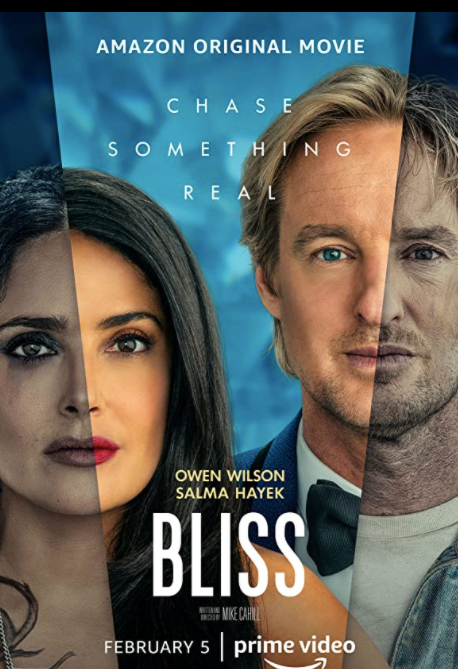
Just saw Bliss on Amazon Prime Video. In a phrase, it's another well-acted simulation movie, with an obvious, even hackneyed story, but it's very well acted by Owen Wilson (Greg) and Salma Hayek (Isabel), with an appearance by Bill Nye the science guy, and excellent music, especially a really beautiful, captivating song under the closing credits, written by Will Bates and sung by Skye Edwards.
Just to be clear: Bliss is no Matrix, not even close, but then again, what is? Matrix, the first movie in particular, is the best simulation movie ever made, which touches almost all of the bases and invents some while it's at it. Bliss, in contrast, asks us once again what is real and what is simulation, and likely doesn't even provide an answer in the end, unless that answer is both are real, which is something we've also seen before.
But the micro-stories are good. Greg and Isabel make an effective, even memorable couple, with Hayek giving one of the best performances of her career. Isabel apparently is from the simulated, drug induced, or whatever engendered world, and she's ultimately in competition with Greg's daughter, who wants him back and with her in what presumably is the real world. [Spoiler: It seems that blood is thicker than mercurial water.]
I have a suggestion: I think what I just saw in Bliss would have worked better as the debut of a 10-episode television series, rather than a standalone hour-and-three-quarter movie. The problem is in the three quarters -- Bliss the movie seems like three quarters at best of a possibly much better narrative.
But I'd say, see it, because, who knows, we may get a couple of sequels.
Welcome to Light On Light Through, Episode 166, in which I discuss how opinions and lies compete with facts in today's media, and lead to increasing polarization.
Further reading:
Thanks University of Notre Dame for the image.

He knows he's a Montana State Trooper, and says so, several times. He quotes from Jaws. But he (apparently) has no memory of being part of a kidnapping ring or killing that fisherman. I say "apparently" because I suppose it's possible that he's faking his amnesia, though I don't think so. He was, after all, shot in the head.
Meanwhile, Ronald has dyed his hair and killed his mother, as I knew he would (kill his mother, that is -- I had no idea he would dye his hair). He almost kills Rick's wife Merilee, when Jenny and Cassie show up at her door with a pretty good sketch of Ronald. The episode ends with them at the door, but it's a good bet that Rick's wife will survive, and in fact I'm pretty sure I saw her in the coming attractions.
So here's where it looks like this story may be headed. Rick continues his recovery, but still has no memory of what he was doing with Ronald. In fact, he could be helpful in nabbing Ronald, wherever he may go after leaving Merilee's house. The question then will be: when will Rick recover his lost memories, and realize he wasn't just a Montana State Trooper.
I'm still liking Big Sky, mostly now because it's less predictable than most narratives like this. I mean, yeah, it was clear that Ronald's mother's days were numbered, but Rick's trajectory, especially his being shot in the head and its aftermath, is continuously surprising. A good thing in a crime story.
See you back here next week.
See also Big Sky 1.1: A Pretty Big Deal ... Big Sky 1.2: The "Goods" and the Ruined Plan ... Big Sky 1.3: "You Kidnapped the Wrong Girl" ... Big Sky 1.4: Controls on Psychos ... Big Sky 1.5: Winter Finale Indeed! ... Big Sky 1.6: "Sweet Psycho"